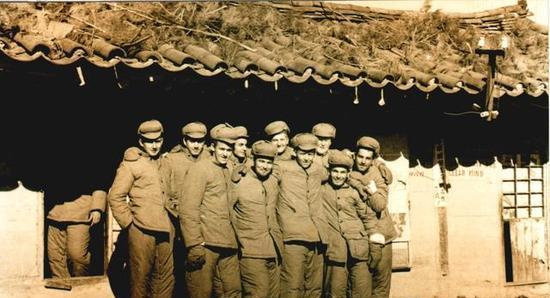
A few days ago, the last AMERICAN soldier who defected was confirmed to have passed away, which attracted close attention from the Western media. In fact, in history, many U.S. soldiers have become "traitors" in the eyes of the U.S. government, the most famous of which is that in 1953, 22 "United Nations" soldiers (including 21 U.S. soldiers and 1 British soldier) refused to return to China after the war
During the war, both warring camps captured many of each other's soldiers. To the surprise of the "United Nations Army", 23 American soldiers and 1 British soldier refused to return to Their home countries.
The stakes were high, and the Chinese Volunteers mobilized prisoners of war from the United States and Britain who were unwilling to repatriate them to Kaesong near the "38th Parallel" and were managed by the China Repatriation Committee, so that they would carefully consider whether to repatriate them. The refusal of so many US prisoners of war to repatriate them has caused the United States to lose face, so the United States racked its brains to lure prisoners of war back to China; on the one hand, the United States sent priests to do the "soul work" of prisoners of war; on the other hand, it broadcast recordings of prisoners of war's parents, and even lured them to return to China with a rich annual salary after returning home. In order to get the prisoners of war to agree to return home as soon as possible, the United States also created lies and deceptions, for example, the United States lied that the father of second-class soldier James George Winneres was ill; an Indian in Tokyo, Japan, wanted to give Winneres a large deposit to be collected; the manager of an American company sent him a letter of appointment to return to be a deputy manager; and an American woman sent a photo and wanted to marry him. Before the deadline, U.S. radio south of the Inter-Korean DEMZ sent word to the prisoners of war: "We think some of you are eager for repatriation." After hearing the propaganda broadcast, Sergeant Richard Corden, a prisoner of war, asked his companions, "Do any Americans want to return home?" His companions replied, "No! ”
In the face of the US conspiracy and deception, only 2 US soldiers were deceived, and the remaining 21 US prisoners of war and 1 British prisoner of war were resolute, and they took the initiative to submit an application to the Chinese Red Cross Society, strongly demanding to stay in China to engage in socialist construction. Two American prisoners of war who had changed their minds, Corporal Claude Batcheler and Corporal Edward Dickenson, were repatriated without what the U.S. side had promised, but instead were immediately arrested by the gendarmes, who were court-martialed and sentenced to prison. For the 21 U.S. prisoners of war who did not want to return to China, the U.S. military top brass was furious and publicly announced their dismissal, and the US judicial community also believed that they needed to be criminally responsible for their actions, and MacArthur, the former commander-in-chief of the "United Nations Army" who had long been dismissed, scolded these prisoners of war as traitors and apostates. Lieutenant Colonel Linddorp, Director of The Admiralty's Intelligence Department, said Andrew Condrant, a British Marine who refused to return home, was considered a deserter and should be arrested and tried under military law for trespassing.
At 4 a.m. on February 24, 1954, a train transporting prisoners of war who did not want to return to China crossed the Yalu River into China. Arranged by the Red Cross Society of China, they visited the factories and countryside of New China, and then studied politics and Chinese history in Taiyuan. After that, the Red Cross gave them 4 choices: go to the countryside, go to the factory, go to university or idle. Most of them choose to go to factories or work in rural areas. Of the 22 American and British prisoners of war, the most famous was Winnerys, who became a Communist and took the Chinese name "Old Wen". Wenneres lived in China for half a century, working as a factory worker for 27 years, studying at Chinese Min University, and later as an English professor at Shandong University. He died in China in 2004.